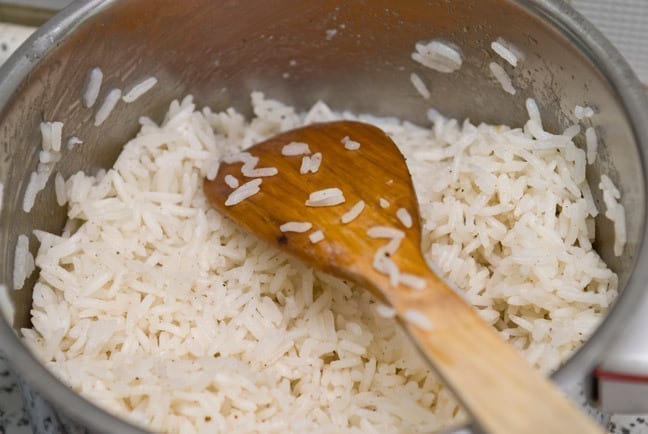Rice is one of the easiest, most inexpensive foods to make. Which explains why you can find it (in one form or another) in almost every type of cuisine. And now, scientists have found a way to make it healthier — specifically, by cutting its calorie count in half.
White rice is a starch, which means it breaks down into sugar and is promptly turned to fat in your body. Some studies have even linked it to a higher diabetes risk. If we were to make white rice healthier, imagine how many people who eat it every day could benefit.
The Washington Post reports that a student and professor at the University of Sri Lanka have discovered that manipulating the rice just a bit while it’s cooking can drastically cut the calories and provide some added health perks. According to their presentation at the National Meeting & Exposition of the American Chemical Society (ACS) on Monday, here’s what to do:
Cook the rice normally, but when the water is boiling and before adding the rice, add coconut oil. Then cook the rice as usual, and let it cool in the refrigerator for 12 hours after it’s done.
Voila! Magic. But… how? Wouldn’t adding coconut oil increase the amount of calories? Apparently there are two types of starches — the kind that go straight to your gut (digestible starches), and the kind that we can’t digest (resistant starches) so they aren’t converted to glucose and therefore, pack on less calories. And the way you cook starchy foods can actually alter the levels of each type of starch.
READ MORE: Why I’m Obsessed With Coconut Oil (And You Should Be, Too)
What Sri Lankan student Sudhair James and his professor Dr. Pushparajah Thavarajva found was that adding a lipid to the water before cooking the rice changes the type of starch. “The oil interacts with the starch in rice and changes its architecture,” James told the Washington Post. “Chilling the rice then helps foster the conversion of starches. The result is a healthier serving, even when you heat it back up.”
This cooking method produced a 10-12% calorie reduction, they said, but the researchers expect higher outcomes with other varieties of rice and different oils. They expect to reduce some of the calorie counts by 50-60%, which could make a huge impact on health and disease rates around the world — especially if this chemistry could be applied to other foods.
READ MORE: Ask a Scientist: Are Potatoes Good or Bad for You?




































